Ginger Dehlinger's Blog, page 5
March 6, 2020
My Favorite Author
People often ask me to name my favorite author, and I’m sorry to report I receive few nods of approval when I say, “Annie Proulx.” I get a few ahas when I mention she wrote “Brokeback Mountain,” but none of my friends and acquaintances seem to have heard of or read her Pulitzer Prize-winning novel, The Shipping News.
I began reading Annie Proulx’s work in earnest after I found out she wrote "Brokeback Mountain," and that was after I had seen the movie. Since most of her work is set in the West, I read everything I could get my hands on while doing research for my novel, Never Done, a story inspired by my great-grandmother who moved to Colorado in the 1890’s.
Like Proulx, most of my writing is historical fiction set in the American West, and also like her, I try not to romanticize the past. I also avoid Western stereotypes. If you happen to be a fan of Westerns, my writing contains no Indians attacking wagon trains or land barons usurping the homesteads of poor settlers, no gunfights and no bank robberies. Instead I write about real people, some of them related to me, and how they dealt with life in remote areas without the labor-saving devices and other services we take for granted.
Unlike Proulx, I am fairly conservative when developing my characters. She would most likely say the folks in my stories are milk toast compared to the tough-as-nails people she describes. Here is one of them, a telegraph key operator, who plays a small part in her short story, “Them Old Cowboy Songs.”
His face and neck formed a visor of scars, moles, wens, boils, and acne. One leg was shorter than the other, and his voice twanged with catarrh.
Thus far, "Them Old Cowboy Songs" is my favorite Annie Proulx short story. I have read every word (over 8,000) five times or more, and the story still staggers me. You will find it in Just the Way It Is.
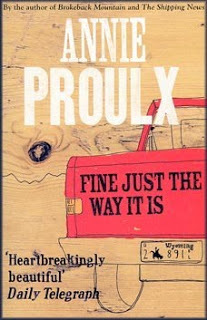
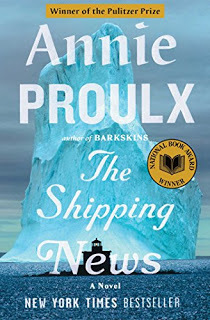
I began reading Annie Proulx’s work in earnest after I found out she wrote "Brokeback Mountain," and that was after I had seen the movie. Since most of her work is set in the West, I read everything I could get my hands on while doing research for my novel, Never Done, a story inspired by my great-grandmother who moved to Colorado in the 1890’s.
Like Proulx, most of my writing is historical fiction set in the American West, and also like her, I try not to romanticize the past. I also avoid Western stereotypes. If you happen to be a fan of Westerns, my writing contains no Indians attacking wagon trains or land barons usurping the homesteads of poor settlers, no gunfights and no bank robberies. Instead I write about real people, some of them related to me, and how they dealt with life in remote areas without the labor-saving devices and other services we take for granted.
Unlike Proulx, I am fairly conservative when developing my characters. She would most likely say the folks in my stories are milk toast compared to the tough-as-nails people she describes. Here is one of them, a telegraph key operator, who plays a small part in her short story, “Them Old Cowboy Songs.”
His face and neck formed a visor of scars, moles, wens, boils, and acne. One leg was shorter than the other, and his voice twanged with catarrh.
Thus far, "Them Old Cowboy Songs" is my favorite Annie Proulx short story. I have read every word (over 8,000) five times or more, and the story still staggers me. You will find it in Just the Way It Is.


Published on March 06, 2020 10:38
February 8, 2020
Red-faced Characters
As long as I can remember, I have had to deal with the reddening of my face. I blush easily, and my face gets bright red with exertion. I played a lot of tennis in my youth, and people used to attribute the glow on my face to sunburn.
"No," I would tell them. "It will go away in a few minutes."
Other reasons a person's face might become red or rosy are anger, shyness, embarrassment, or shame. Also hot flashes, another red face issue I've been blessed with.
Some people blush if they are suddenly the center of attention, while speaking in public, when they have been caught telling a lie, or if encountering someone they have a crush on.
Technically speaking, blushing is due to the sudden arousal of the sympathetic nervous system. When a person feels uncomfortable (as described in the previous paragraph), the small blood vessels in the face, ears, and neck dilate, turning the skin some shade of pink or red. One of the first signs of anger is a reddening of the ears.
As a writer, giving a character a red face is a way to describe him or her without having to state the obvious: he was angry, she was embarrassed. Over the years I have created a stockpile of red-face expressions that I can use where appropriate. Below are some of my favorites.
color flooded his face (or cheeks); she felt her cheeks heating up; shamefaced; her cheeks flamed as her mouth went dry; her face turned scarlet with anger; angry red glare; his color deepened; a pink glow rose from his neck to his hairline; blushed, flushed, reddened
I'm always looking for different ways to describe a red face, and will greatly appreciate those you are willing to share
[image error]
"No," I would tell them. "It will go away in a few minutes."
Other reasons a person's face might become red or rosy are anger, shyness, embarrassment, or shame. Also hot flashes, another red face issue I've been blessed with.
Some people blush if they are suddenly the center of attention, while speaking in public, when they have been caught telling a lie, or if encountering someone they have a crush on.
Technically speaking, blushing is due to the sudden arousal of the sympathetic nervous system. When a person feels uncomfortable (as described in the previous paragraph), the small blood vessels in the face, ears, and neck dilate, turning the skin some shade of pink or red. One of the first signs of anger is a reddening of the ears.
As a writer, giving a character a red face is a way to describe him or her without having to state the obvious: he was angry, she was embarrassed. Over the years I have created a stockpile of red-face expressions that I can use where appropriate. Below are some of my favorites.
color flooded his face (or cheeks); she felt her cheeks heating up; shamefaced; her cheeks flamed as her mouth went dry; her face turned scarlet with anger; angry red glare; his color deepened; a pink glow rose from his neck to his hairline; blushed, flushed, reddened
I'm always looking for different ways to describe a red face, and will greatly appreciate those you are willing to share
[image error]
Published on February 08, 2020 16:47
January 6, 2020
Okay, Okay, Okay
I just finished reading Mother Tongue, English & How It Got That Way by Bill Bryson. This book is jam-packed with information about English, from its origins to the development of profanity to the language's future. It must have taken the author years to do the research, and what an outstanding job he did!
One topic I found particularly interesting was the mostly American English word O.K., or however you choose to spell it. This word, thankfully a positive one, has been picked up and used to some degree by speakers of many languages around the world. It is also possibly the most versatile word in English.
Here are a few examples:
"Just O.K." (an action done minimally well-adverb)
"is not O.K." (description of the action's outcome-adjective)
"I need Management's O.K. before I can publish this." (noun)
"Will you O.K. my request?" (verb)
"O.K., I've had about enough of this nonsense." (interjection)
It's also a word that can be delivered both positively ("O.K!") and negatively ("O.K., if I have to.")
The word's first appearance in print was in 1839 in the Boston Morning Post. The author suggests O.K. may have stemmed from a fad that developed in 1838 among New York and Boston writers who poked fun at the language by using O.W. for "oll wright" and O.K. for "oll korrect." Also in 1839, Martin Van Buren ran for reelection. His nickname was Old Kinderhook (based on the small New York town he came from). A group of Democrats who worked on his campaign gave themselves the name Democratic O.K. Club. "Club O.K." became a widespread slogan used throughout the campaign, and though Van Buren lost, O.K. won the hearts of the American people.

One topic I found particularly interesting was the mostly American English word O.K., or however you choose to spell it. This word, thankfully a positive one, has been picked up and used to some degree by speakers of many languages around the world. It is also possibly the most versatile word in English.
Here are a few examples:
"Just O.K." (an action done minimally well-adverb)
"is not O.K." (description of the action's outcome-adjective)
"I need Management's O.K. before I can publish this." (noun)
"Will you O.K. my request?" (verb)
"O.K., I've had about enough of this nonsense." (interjection)
It's also a word that can be delivered both positively ("O.K!") and negatively ("O.K., if I have to.")
The word's first appearance in print was in 1839 in the Boston Morning Post. The author suggests O.K. may have stemmed from a fad that developed in 1838 among New York and Boston writers who poked fun at the language by using O.W. for "oll wright" and O.K. for "oll korrect." Also in 1839, Martin Van Buren ran for reelection. His nickname was Old Kinderhook (based on the small New York town he came from). A group of Democrats who worked on his campaign gave themselves the name Democratic O.K. Club. "Club O.K." became a widespread slogan used throughout the campaign, and though Van Buren lost, O.K. won the hearts of the American people.

Published on January 06, 2020 10:29
December 8, 2019
Hackneyed Expressions
Nothing makes me groan harder than finding a hackneyed expression in something I read, and I go to great lengths to avoid them when I write. I make an exception for dialog since people frequently use these sayings in conversation.
I do, however, finds the source of these sayings interesting. Below is an explanation of some of these expressions. I received this as an email that included no information as to the source, so my apologies to the person who produced it.

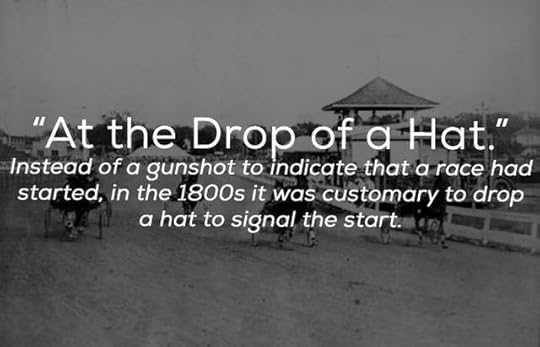
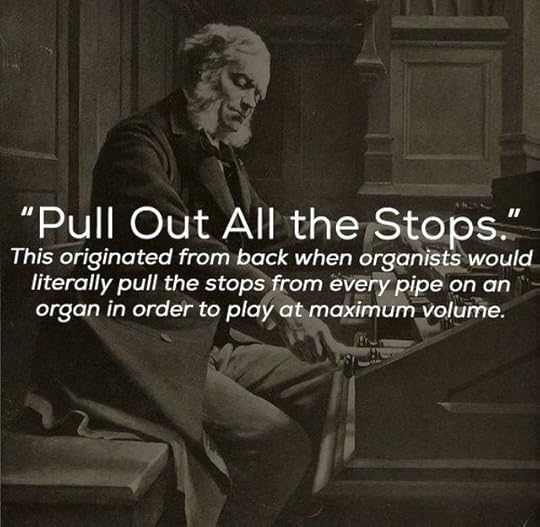
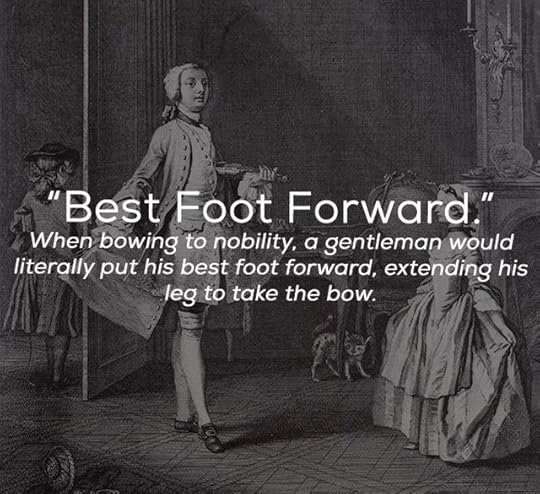
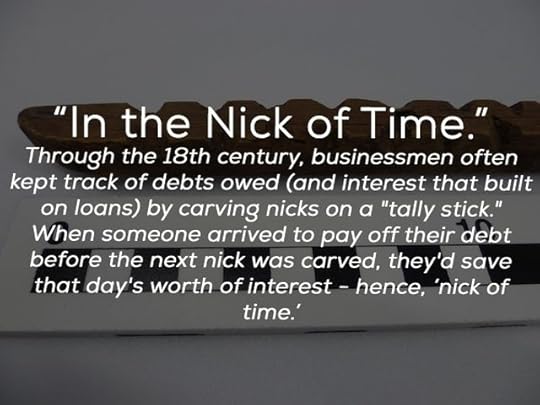
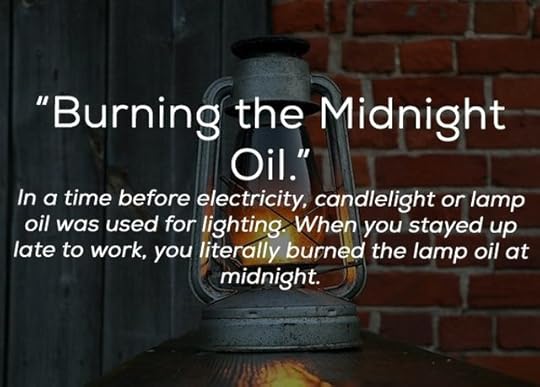
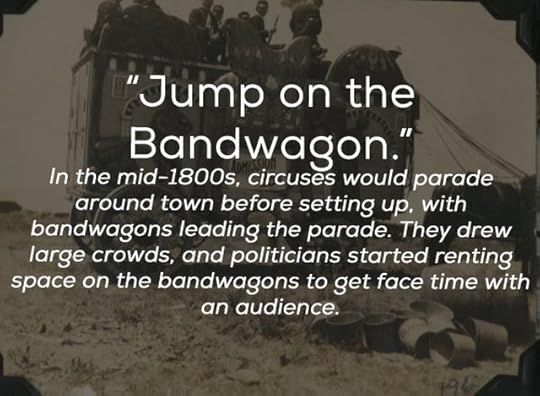
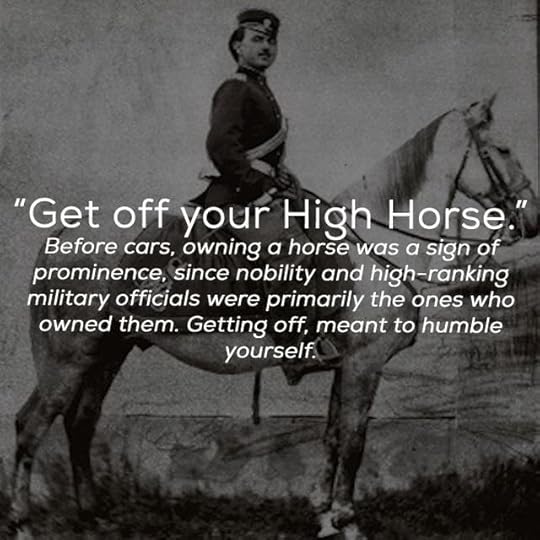
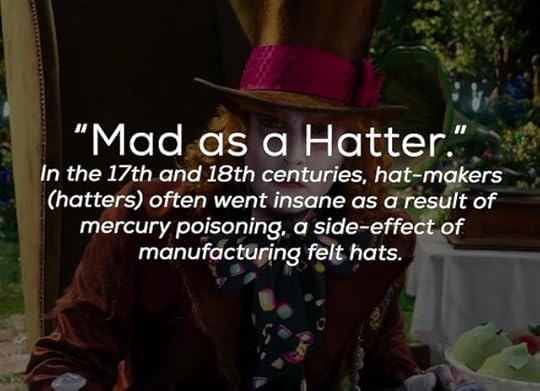
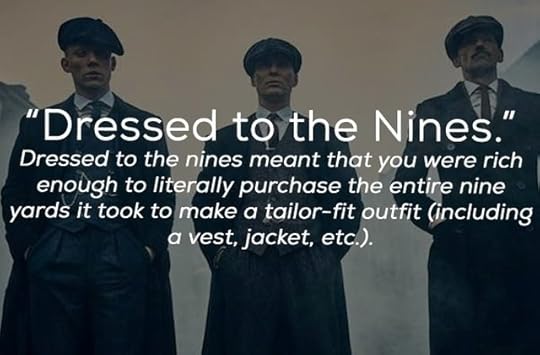
I do, however, finds the source of these sayings interesting. Below is an explanation of some of these expressions. I received this as an email that included no information as to the source, so my apologies to the person who produced it.










Published on December 08, 2019 10:03
November 7, 2019
Books Make Great Gifts
As we approach the holiday gift-giving season, I would like to remind my followers that a book or books could be the perfect gift for someone on your list. Besides giving someone the joy that lies between the covers, books are a snap to wrap. You won't have to deal with a weird shape, and don't have to look for a box. How great is that at this busy time of year?
Another benefit of gifting books is you can mail a book for less postage than an item of comparable weight. If you mail only the book--no other items--you can send it media rate. This can only be done at the post office and you will have to ask the agent for media rate. Don't wait till the last minute. Media rate usually takes a couple of days longer than regular mail.

Another benefit of gifting books is you can mail a book for less postage than an item of comparable weight. If you mail only the book--no other items--you can send it media rate. This can only be done at the post office and you will have to ask the agent for media rate. Don't wait till the last minute. Media rate usually takes a couple of days longer than regular mail.

Published on November 07, 2019 12:29
October 10, 2019
My Favorite Westerns
According to Noelle Buffam, writing for The Script Lab, "Western Film is a genre that revolves around stories primarily set in the late 19th century in the American Old West. Most Westerns take place between the American Civil War (1865) and the early 1900s. Common themes within Western film include: the conquest of the wild West, the cultural separation of The East and the West, the West's resistance to modern change, the conflict between cowboys and Indians, outlaws, and treasure/gold hunting. American Western film usually revolves around a stoic hero and emphasizes the importance of honor and sacrifice."
I still enjoy a good Western, especially those with an unusual twist, compelling story, and top-notch actors. Once a dependable money-maker for movie studios, Westerns are now more often box office disappointments. The films that do succeed are not the rootin'-tootin', singing cowboy, unscrupulous landowner VS small rancher, cattle rustling variety that filled movie screens for decades.
Below, in alphabetical order, are my all-time favorites.
Butch Cassidy and the Sundance Kid (1969): screenplay by William Goldman. Goldman won the Oscar that year for best original screenplay. Light-hearted, yet authentic.
Dances With Wolves (1990): adapted from a book by Michael Blake. This film won the Best Picture Oscar. What an amazing, beautifully adapted story!
Hostiles (2017): screenplay by Donald Stewart based on a story by Donald E. Stewart. Violent, yet true to what life was like for settlers and Native Americans when the West was still wild.
Legends of the Fall (1994): book by Jim Harrison. In my opinion, this film never received the recognition it should have.
Lonesome Dove (1985): Not a movie, but a TV miniseries adapted from a book written by the phenomenal Western writer, Larry McMurtry. I never get tired of watching both Lonesome Dove and its sequel, Return to Lonesome Dove.
The Magnificent Seven (1960): screenplay by William Roberts (a remake of Akira Kurosawa's 1954 Japanese film Seven Sumurai. I cry every time I watch it. I've never watched the remake, nor do I intend to. Yul Brynner and Charles Bronson are irreplaceable.
The Unforgiven (1992): screenplay by David Webb Peoples. Another Western film that won the Oscar for Best Picture. Tough to watch, but excellent.
If you haven't watched one or more of these films, and you aren't a Western genre naysayer, I don't believe you will be disappointed.
I still enjoy a good Western, especially those with an unusual twist, compelling story, and top-notch actors. Once a dependable money-maker for movie studios, Westerns are now more often box office disappointments. The films that do succeed are not the rootin'-tootin', singing cowboy, unscrupulous landowner VS small rancher, cattle rustling variety that filled movie screens for decades.
Below, in alphabetical order, are my all-time favorites.
Butch Cassidy and the Sundance Kid (1969): screenplay by William Goldman. Goldman won the Oscar that year for best original screenplay. Light-hearted, yet authentic.
Dances With Wolves (1990): adapted from a book by Michael Blake. This film won the Best Picture Oscar. What an amazing, beautifully adapted story!
Hostiles (2017): screenplay by Donald Stewart based on a story by Donald E. Stewart. Violent, yet true to what life was like for settlers and Native Americans when the West was still wild.
Legends of the Fall (1994): book by Jim Harrison. In my opinion, this film never received the recognition it should have.
Lonesome Dove (1985): Not a movie, but a TV miniseries adapted from a book written by the phenomenal Western writer, Larry McMurtry. I never get tired of watching both Lonesome Dove and its sequel, Return to Lonesome Dove.
The Magnificent Seven (1960): screenplay by William Roberts (a remake of Akira Kurosawa's 1954 Japanese film Seven Sumurai. I cry every time I watch it. I've never watched the remake, nor do I intend to. Yul Brynner and Charles Bronson are irreplaceable.
The Unforgiven (1992): screenplay by David Webb Peoples. Another Western film that won the Oscar for Best Picture. Tough to watch, but excellent.
If you haven't watched one or more of these films, and you aren't a Western genre naysayer, I don't believe you will be disappointed.
Published on October 10, 2019 10:12
September 4, 2019
Getting Those All-Important Reviews
While I was in the process of writing my first novel I sometimes caught myself imagining the thrill of reading a review of my book in one of the local newspapers. Sometimes that thrill would turn to dread when I pictured a negative review, but I still wanted the feedback and publicity. My wildest dreams were not wild enough to expect a review in the New York Times or even The Oregonian, however I did believe the Klamath Falls Herald and News and The Bulletin in Bend would print one. After all, most of Brute Heart takes place in Klamath Falls and I was a long-time resident of Bend. How naïve of me! Local newspapers simply do not have staffs large enough to read and review books by local authors or even established authors. The reviews they do print are written by staffers working for the New York Times News Service, Los Angeles Times, Newsday, etc.
I was also shy about asking friends or family members for reviews of my first novel. But that disappeared by the second novel. By the time Never Done was released I was bolder and armed with a better understanding of the relationship of reviews to sales. Since then, when someone compliments either of my novels I say, “May I ask a favor? If you enjoyed the book, will you please write a review on Amazon?” (or Goodreads if they have an account) I only have 10 reviews for Brute Heart but as of today, 37 for Never Done. A few of the people I asked for reviews said they couldn’t figure out where to write a review on Amazon. So-o-o-o, I wrote an instruction sheet.
How To Write a Review on Amazon
Under the book's title, Kindle Edition, you will see the current number of customer reviews.Click on that link.You will see a bar graph picturing the number of stars the book has received so far.Below the graph is the "write customer review" box. Click on that.Five empty stars will appear.Click on the star that best fits your opinion of the book with five being highest.You may insert a photo at the next prompt, but it is optioal.Next, Amazon would like a headline from you: a brief overall statement of what you think is most important for a potential reader to know about the book.After writing the headline, please write your review in the space provided.Don't forget to click "submit" at the very end.It isn’t necessary to write a long review. Potential readers often skip long, detailed posts. They just want to find their next book and get started on it.
Never Done has been in print for over two years now, so I rarely get a new review. Nevertheless, I am thrilled with those I have received and still ask for a review if a situation seems to warrant it.
I was also shy about asking friends or family members for reviews of my first novel. But that disappeared by the second novel. By the time Never Done was released I was bolder and armed with a better understanding of the relationship of reviews to sales. Since then, when someone compliments either of my novels I say, “May I ask a favor? If you enjoyed the book, will you please write a review on Amazon?” (or Goodreads if they have an account) I only have 10 reviews for Brute Heart but as of today, 37 for Never Done. A few of the people I asked for reviews said they couldn’t figure out where to write a review on Amazon. So-o-o-o, I wrote an instruction sheet.
How To Write a Review on Amazon
Under the book's title, Kindle Edition, you will see the current number of customer reviews.Click on that link.You will see a bar graph picturing the number of stars the book has received so far.Below the graph is the "write customer review" box. Click on that.Five empty stars will appear.Click on the star that best fits your opinion of the book with five being highest.You may insert a photo at the next prompt, but it is optioal.Next, Amazon would like a headline from you: a brief overall statement of what you think is most important for a potential reader to know about the book.After writing the headline, please write your review in the space provided.Don't forget to click "submit" at the very end.It isn’t necessary to write a long review. Potential readers often skip long, detailed posts. They just want to find their next book and get started on it.
Never Done has been in print for over two years now, so I rarely get a new review. Nevertheless, I am thrilled with those I have received and still ask for a review if a situation seems to warrant it.
Published on September 04, 2019 15:51
August 3, 2019
My Favorite Novels
When I tell people I am an author, albeit not a famous one, they often ask, "What are your favorite books?" Since I prefer fiction over non-fiction, I list my favorite novels. If I were to list the books in the order I read them, my favorites would begin with Gone With the Wind by Margaret Mitchell. I read it in the seventh grade. After that tear jerker, I was too busy studying during high school and college to read for sheer pleasure.
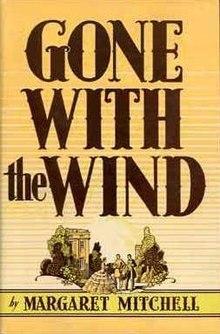
As an adult, the next novel I hated to see end was The Thornbirds by the Australian author Colleen McCullough. I shared the book with my father, a smart man who quit high school at fifteen, and he enjoyed it, too. Though he never realized his potential, he read a great many books during his later life.
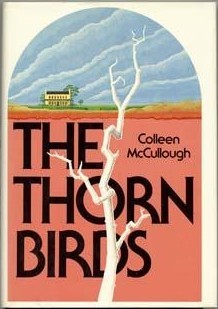
The Joy Luck Club by Amy Tan was the next book that left an impression on me. I felt a strong emotional tie to this saga about mothers and daughters and cultural change. Although it is about Chinese immigrants to America, the emotions the author conveys are universal.
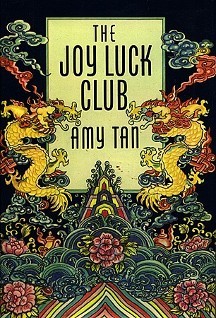
The seven years I lived in Connecticut and commuted daily to Manhattan I read scores of books during the hour + train ride to and from work. I read what I saw other people reading--Follett, Michenor, Ludlum, etc. I found these author's books highly entertaining but they didn't touch my soul.
It wasn't until I was doing research for my second novel that I ran across one that rocked my world--Angle of Repose by Wallace Stegner, Pulitzer Prize winner in 1972. Set in Colorado during the same time period as my great-grandmother lived, I read it cover to cover three times.
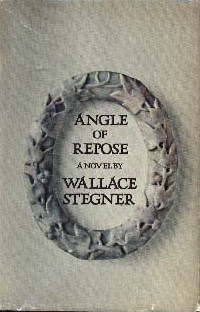
I have been an animal lover all my life, so I naturally fell in love with The Art of Racing in the Rain by Garth Stein. I used a box of Kleenex while reading it. As an author I appreciate the patience the author used, writing from the perspective of a dog yet pacing the story as beautifully as he did.
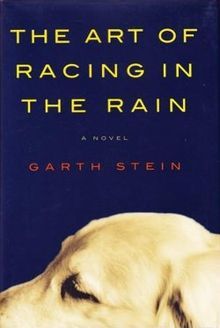

As an adult, the next novel I hated to see end was The Thornbirds by the Australian author Colleen McCullough. I shared the book with my father, a smart man who quit high school at fifteen, and he enjoyed it, too. Though he never realized his potential, he read a great many books during his later life.

The Joy Luck Club by Amy Tan was the next book that left an impression on me. I felt a strong emotional tie to this saga about mothers and daughters and cultural change. Although it is about Chinese immigrants to America, the emotions the author conveys are universal.

The seven years I lived in Connecticut and commuted daily to Manhattan I read scores of books during the hour + train ride to and from work. I read what I saw other people reading--Follett, Michenor, Ludlum, etc. I found these author's books highly entertaining but they didn't touch my soul.
It wasn't until I was doing research for my second novel that I ran across one that rocked my world--Angle of Repose by Wallace Stegner, Pulitzer Prize winner in 1972. Set in Colorado during the same time period as my great-grandmother lived, I read it cover to cover three times.

I have been an animal lover all my life, so I naturally fell in love with The Art of Racing in the Rain by Garth Stein. I used a box of Kleenex while reading it. As an author I appreciate the patience the author used, writing from the perspective of a dog yet pacing the story as beautifully as he did.

Published on August 03, 2019 11:30
July 5, 2019
Spell Or Use Numbers When You Write
Most writers—including me—like to write for three reasons: We’re creative, we love to read and because we hate working with numbers. Eventually we find out that even in writing, numbers find a way to sneak into our work.
There are several rules of thought on how to handle writing numbers, but the most common is pretty simple. Spell out numbers under 10 (zero through nine), and use numeric symbols for 10 and up. I brought two puppies home from the pound. During my lifetime I have adopted 12 dogs.
Of course since we are using the English language, there are some exceptions to the rule. For example, spell out all numbers that begin a sentence. Forty-seven-thousand contestants were turned down for “American Idol.” Eleven were selected. If you don’t feel like writing long, space-gobbling numbers, just rephrase your sentence into American Idol turned down 47,000 contestants.
An exception to the exception is calendar years. Always use numerals for them even at the front of a sentence. 1997 was the year I was born. Another instance where the under-10/over-10 rule doesn’t apply is when writing peoples’ ages. (“She's only 4 years old”). Also when writing dates (December 25), monetary amounts ($5), percentages (25 percent) and ratios (2-to-1).
If you need to use two related numbers in the same sentence, write both as numerals if one of them should be written as a numeral. For example, normally you would write out the word "one" when writing "The snail advanced one inch." However, if you were to add a number over nine to that sentence, you would use numerals for both measurements. "The snail advanced 1 inch on the first day and 12 inches on the second."
Now, even though you might never have been a math whiz, you can be an expert at using numbers in your writing.
Published on July 05, 2019 12:27
June 15, 2019
Autocorrect--Friend or Foe?
Below is an article I found amusing and pertinent enough to share with my followers. It was written by Joe Queenan who writes the "Moving Targets" column for the Wall Street Journal. The last paragraph is my favorite.
Because I have poor vision and can’t type and often send text messages while staggering through dark alleys, my friends and family often get messages from me that make no sense. The autocorrect function either leaves obvious mistakes in place—“clowns” is not spelled “closns”—or it cavalierly substitutes what it thinks I should be texting without consulting me. As in: “I just finished reading ‘Anna Karen in a.’ It’s very avant garden.”Think how different history might have been if famous people had depended on autocorrect when texting. If Julius Caesar in the heat of battle had typed “veni, vidi, vici” into his iPhone, the Roman Senate would have had no idea what he was trying to say when the message arrived. “What does ‘Gino Video Vicious’ mean, Flavius Maximus?” a baffled Roman politician might have asked his press secretary.“You got me,” the flummoxed factotum would reply. “His assistant just texted me, ‘Gino Visit Vick.’ Maybe it’s some kind of code.”
As is widely known, the various versions of autocorrect arbitrarily alter text, believing that they can intuit what the sender of the message wishes to say. But if you are typing in dim light or without your reading glasses or while driving or under extreme duress, or in a hammered condition, the results can be absurd. “Foreskinned and seven years ago…” would have certainly gotten the Gettysburg Address off to a bizarre start when Abraham Lincoln mouthed these words back in 1863. Honest Abe would have been met with equally puzzled stares had he remarked: “You can fuel all of the people some of the time.”“I only regret that I have but one wife to lose for my country” almost certainly would not have had the effect Nathan Hale was looking for before being hanged.Winston Churchill’s “I have nothing to offer but blood, toil, tears and sweaters” would have been confusing to harried Britons living through the Blitz in 1940. As would the old saying, “If you’re going through Hull, keep going.”“A date which will live in infancy…” would have puzzled Americans the day after Dec. 7, 1941. Same thing for “The only thing we have to fear is fur itself.” Or, as the autocorrected Yogi Berra might have put it: “It ain’t oval till it’s oval.”Had autocorrect existed even a few decades ago, it might have had a tremendous effect on many touchstone expressions from popular culture. “Lunch means never having to say you’re sorry,” would be the phrase most remembered from “Love Story.” And let us not forget Humphrey Beaugard’s immortal line, “We’ll always halve Paris,” from the autocorrected film “Cass’s Blanket.”Autocorrect would have had a wonderful time reconfiguring song titles (“Newark State of Mind,” “Bully Jean”) and song lyrics (“My gift is my song, and this one’s for Hugh.”) And the most beloved Broadway offerings would now include “The Kink and I” and “Goys and Dills,” alongside more serious fare like “The Nice Man Cometh” and “12 Hungry Men.”If artists were not paying close attention, autocorrect would have massacred the titles of their paintings (“Whistling Mothers,” “The Moaning Lisa”). And the function would have dramatically altered the titles of many famous books: “War and Pizza,” “Tender Is the Nightie.”As for the immortal bard, author of “Whatcha Do About Nothing” and “Omelet,” he might have let autocorrect rename one of his least successful plays, “Trolls and Cressida,” witch is weight butter.
Because I have poor vision and can’t type and often send text messages while staggering through dark alleys, my friends and family often get messages from me that make no sense. The autocorrect function either leaves obvious mistakes in place—“clowns” is not spelled “closns”—or it cavalierly substitutes what it thinks I should be texting without consulting me. As in: “I just finished reading ‘Anna Karen in a.’ It’s very avant garden.”Think how different history might have been if famous people had depended on autocorrect when texting. If Julius Caesar in the heat of battle had typed “veni, vidi, vici” into his iPhone, the Roman Senate would have had no idea what he was trying to say when the message arrived. “What does ‘Gino Video Vicious’ mean, Flavius Maximus?” a baffled Roman politician might have asked his press secretary.“You got me,” the flummoxed factotum would reply. “His assistant just texted me, ‘Gino Visit Vick.’ Maybe it’s some kind of code.”
As is widely known, the various versions of autocorrect arbitrarily alter text, believing that they can intuit what the sender of the message wishes to say. But if you are typing in dim light or without your reading glasses or while driving or under extreme duress, or in a hammered condition, the results can be absurd. “Foreskinned and seven years ago…” would have certainly gotten the Gettysburg Address off to a bizarre start when Abraham Lincoln mouthed these words back in 1863. Honest Abe would have been met with equally puzzled stares had he remarked: “You can fuel all of the people some of the time.”“I only regret that I have but one wife to lose for my country” almost certainly would not have had the effect Nathan Hale was looking for before being hanged.Winston Churchill’s “I have nothing to offer but blood, toil, tears and sweaters” would have been confusing to harried Britons living through the Blitz in 1940. As would the old saying, “If you’re going through Hull, keep going.”“A date which will live in infancy…” would have puzzled Americans the day after Dec. 7, 1941. Same thing for “The only thing we have to fear is fur itself.” Or, as the autocorrected Yogi Berra might have put it: “It ain’t oval till it’s oval.”Had autocorrect existed even a few decades ago, it might have had a tremendous effect on many touchstone expressions from popular culture. “Lunch means never having to say you’re sorry,” would be the phrase most remembered from “Love Story.” And let us not forget Humphrey Beaugard’s immortal line, “We’ll always halve Paris,” from the autocorrected film “Cass’s Blanket.”Autocorrect would have had a wonderful time reconfiguring song titles (“Newark State of Mind,” “Bully Jean”) and song lyrics (“My gift is my song, and this one’s for Hugh.”) And the most beloved Broadway offerings would now include “The Kink and I” and “Goys and Dills,” alongside more serious fare like “The Nice Man Cometh” and “12 Hungry Men.”If artists were not paying close attention, autocorrect would have massacred the titles of their paintings (“Whistling Mothers,” “The Moaning Lisa”). And the function would have dramatically altered the titles of many famous books: “War and Pizza,” “Tender Is the Nightie.”As for the immortal bard, author of “Whatcha Do About Nothing” and “Omelet,” he might have let autocorrect rename one of his least successful plays, “Trolls and Cressida,” witch is weight butter.
Published on June 15, 2019 09:49



